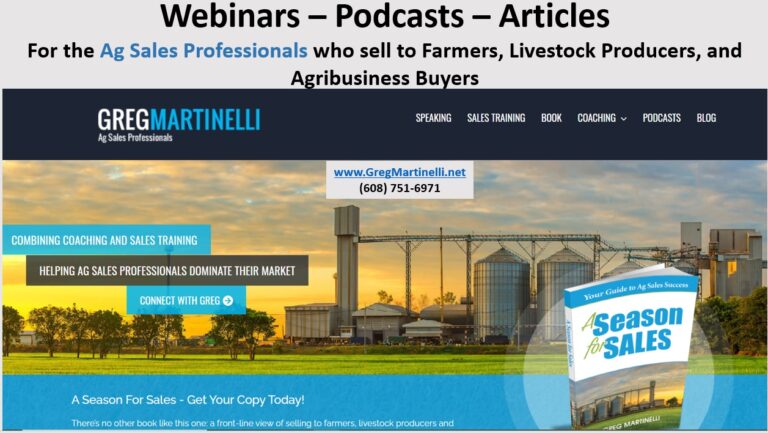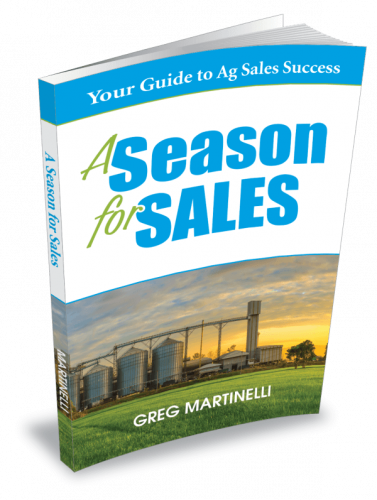Your customer should answer…. “You”
In the 1980’s famous song by Ray Parker Jr, he shouts out, “Who ya gonna call”. Of course, everyone knows the next line to be “Ghost Busters”, a classic comedy. The lyrics to this song point to a very important concept in selling in agribusiness. They refer to all of these scary situations: ghosts in your house, creepy occurrences, something going wrong, etc. The question posed throughout the song is; When this happens, who are you going to call? That’s when, we all yell the answer, “Ghost Busters!”
As an Ag sales professional, what are those very scary things that happen to your customers? What are those moments of truth that your customers have? When they don’t know what to do. When it really matters and all is on the line. When they really just need to call someone. What name would they yell out? Would it be your name?
Some examples:
- When your animals are sick and dying, who ya gonna call?
- When interest rates go up and you want more land, who ya gonna call?
- When your milk production slips for no reason, who ya gonna call?
- When your combine is down at harvest, who ya gonna call?
- When your seed selection didn’t yield enough, who ya gonna call?
Instead of “Who ya gonna call”, the real question is, “Who do you trust to help you with this situation?” Although that doesn’t make for very catchy song lyrics.
Recently, during sales training sessions, I have been asking the attendees to explain how their customers could become better at buying their products. For example, in a group of agronomy salespeople, I would ask, “What is it that your customers need to do differently in order to become better buyers of fertilizer, ag chemicals, seed, etc.?” The one answer I get back routinely is: Trust. To be a better buyer, these salespeople want their customer or prospect to trust that they are there to help them be better farmers.
“Ok”, I answer. “What would that actually look like? What would they do or say that would indicate they trust you to help them?” The training group will reply with various answers: honesty, open communication, stop playing games, etc.
“That’s great”, I reply. “Now, how do you get them to do that?” Referring to being honest, being open in their communication, and not play games? And that’s where the replies from my audience tend to come to a screeching halt. They don’t know where to go with that question. So, I go back to their original answer, “If trust is so important, how do you develop it with your customers? How do you get your customers to answer the Ghost Busters’ theme song with your name?”
This will get a few puzzled looks or maybe a few weak answers. Most salespeople have never thought about how to intentionally build trust with their customers. Many think that if they act trustworthy themselves, then eventually their customer will trust them. That’s true, but that might take a little too long to develop.
To understand trust development, you can look at the three components that develop trust: Credibility, Reliability, and Self/Others Interest.
Credibility: If you want customers to trust you with the success of raising thousands of animals, farming thousands of acres of crops or manufacturing millions of dollars in Ag products, then you need to be credible in your knowledge of their business.
Reliability: The most credible or competent salesperson can’t be trusted if they don’t do what they say they will do. Failing to show up, take notes, and follow up are clear indicators you can’t be trusted.
Self/Others Interest: Your customer needs to think that you have their best interest at heart. That doesn’t mean you discount prices to win their favor and look like you are putting their interest over yours. But showing you care enough to spend the time to understand this specific customer shows your interest in them. You are willing to dig in and understand how you can best help them be better farmers, producers, or a better agribusiness.
To finish this discussion with my training group, I like to ask one final question. By this point, their minds are racing with the ideas of how they might be strong or weak in one of these three areas of trust. I ask, “Have you ever asked your customers? You know this is the most important thing your customers can do. But, have you ever asked them, “Who ya gonna call?”
For further reading on this topic:
- Trust: The ultimate sales tool
- Trust part 2: Rebuilding after the fall
- Keep your campaign promises Podcast recording
- From Peddler to Consultant
_______________________________________________________________________________________


